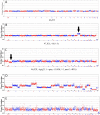Preimplantation genetic testing for hereditary hearing loss in Chinese population
- PMID: 37017887
- PMCID: PMC10352472
- DOI: 10.1007/s10815-023-02753-8
Preimplantation genetic testing for hereditary hearing loss in Chinese population
Erratum in
-
Correction to: Preimplantation genetic testing for hereditary hearing loss in Chinese population.J Assist Reprod Genet. 2023 Jul;40(7):1733. doi: 10.1007/s10815-023-02807-x. J Assist Reprod Genet. 2023. PMID: 37093444 Free PMC article. No abstract available.
Abstract
Purpose: To evaluate the clinical validity of preimplantation genetic testing (PGT) to prevent hereditary hearing loss (HL) in Chinese population.
Methods: A PGT procedure combining multiple annealing and looping-based amplification cycles (MALBAC) and single-nucleotide polymorphisms (SNPs) linkage analyses with a single low-depth next-generation sequencing run was implemented. Forty-three couples carried pathogenic variants in autosomal recessive non-syndromic HL genes, GJB2 and SLC26A4, and four couples carried pathogenic variants in rare HL genes: KCNQ4, PTPN11, PAX3, and USH2A were enrolled.
Results: Fifty-four in vitro fertilization (IVF) cycles were implemented, 340 blastocysts were cultured, and 303 (89.1%) of these received a definite diagnosis of a disease-causing variant testing, linkage analysis and chromosome screening. A clinical pregnancy of 38 implanted was achieved, and 34 babies were born with normal hearing. The live birth rate was 61.1%.
Conclusions and relevance: In both the HL population and in hearing individuals at risk of giving birth to offspring with HL in China, there is a practical need for PGT. The whole genome amplification combined with NGS can simplify the PGT process, and the efficiency of PGT process can be improved by establishing a universal SNP bank of common disease-causing gene in particular regions and nationalities. This PGT procedure was demonstrated to be effective and lead to satisfactory clinical outcomes.
Keywords: Genetic counseling; Hereditary hearing loss; MALBAC; PGT; Whole genome amplification.
© 2023. The Author(s).
Conflict of interest statement
The authors declare no competing interests.
Figures



Similar articles
-
Clinical application of preimplantation genetic testing based on low-coverage next-generation sequencing with linkage analyses in hereditary hearing loss families.J Assist Reprod Genet. 2025 Jun;42(6):1989-2002. doi: 10.1007/s10815-025-03504-7. Epub 2025 May 19. J Assist Reprod Genet. 2025. PMID: 40389765 Free PMC article.
-
Improved clinical outcomes of preimplantation genetic testing for aneuploidy using MALBAC-NGS compared with MDA-SNP array.BMC Pregnancy Childbirth. 2020 Jul 3;20(1):388. doi: 10.1186/s12884-020-03082-9. BMC Pregnancy Childbirth. 2020. PMID: 32620095 Free PMC article.
-
Preimplantation genetic testing for aneuploidies (abnormal number of chromosomes) in in vitro fertilisation.Cochrane Database Syst Rev. 2020 Sep 8;9(9):CD005291. doi: 10.1002/14651858.CD005291.pub3. Cochrane Database Syst Rev. 2020. PMID: 32898291 Free PMC article.
-
Minimizing mosaicism: assessing the impact of fertilization method on rate of mosaicism after next-generation sequencing (NGS) preimplantation genetic testing for aneuploidy (PGT-A).J Assist Reprod Genet. 2019 Jan;36(1):153-157. doi: 10.1007/s10815-018-1347-6. Epub 2018 Oct 25. J Assist Reprod Genet. 2019. PMID: 30362056 Free PMC article.
-
Chromosomal mosaicism in human blastocysts: the ultimate diagnostic dilemma.Hum Reprod Update. 2020 Apr 15;26(3):313-334. doi: 10.1093/humupd/dmz050. Hum Reprod Update. 2020. PMID: 32141501 Review.
Cited by
-
Comparison of Genetic, Auditory Features, and Systemic Clinical Phenotype in 14 Families with Syndromic Hearing Loss.Appl Clin Genet. 2024 Nov 8;17:171-186. doi: 10.2147/TACG.S472898. eCollection 2024. Appl Clin Genet. 2024. PMID: 39534424 Free PMC article.
-
Genomic Landscape of Branchio-Oto-Renal Syndrome through Whole-Genome Sequencing: A Single Rare Disease Center Experience in South Korea.Int J Mol Sci. 2024 Jul 26;25(15):8149. doi: 10.3390/ijms25158149. Int J Mol Sci. 2024. PMID: 39125727 Free PMC article.
References
MeSH terms
Grants and funding
- 2016YFC1000704/Reproductive Health and Serious Birth Defect Prevention Research project
- 2016YFC1000706/Reproductive Health and Serious Birth Defect Prevention Research project
- 81730029/National Natural Science Foundation of China
- 81733706/National Natural Science Foundation of China
- 81870731/National Natural Science Foundation of China
- 81900953/National Natural Science Foundation of China
- 7191011/Beijing Natural Science Foundation
- 7192234/Beijing Natural Science Foundation
- 819MS110/Hainan Provincial Department of Science and Technology
- 2017-JQPY-001/Fostering Funds of Chinese PLA General Hospital for National Distinguish Young Scholar
- 2018YFC1003100/National key research of development program of China
LinkOut - more resources
Full Text Sources
Medical
Miscellaneous

